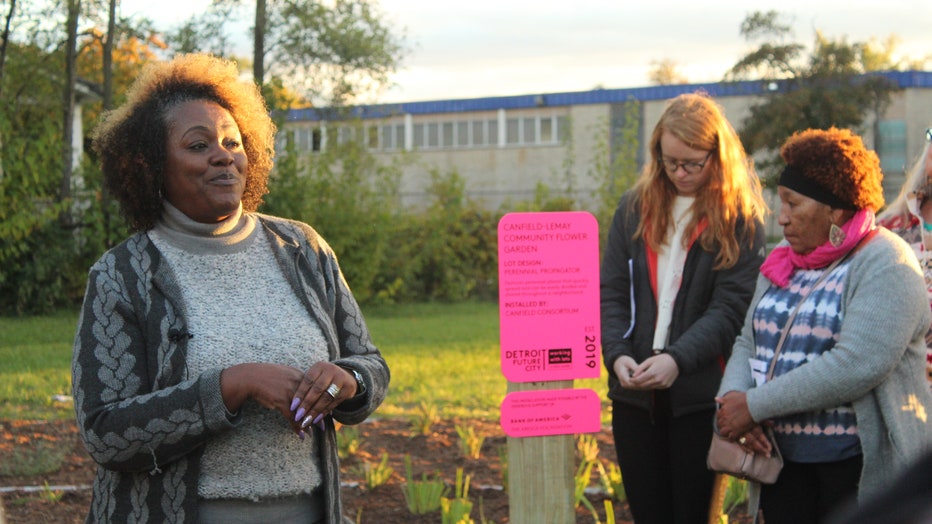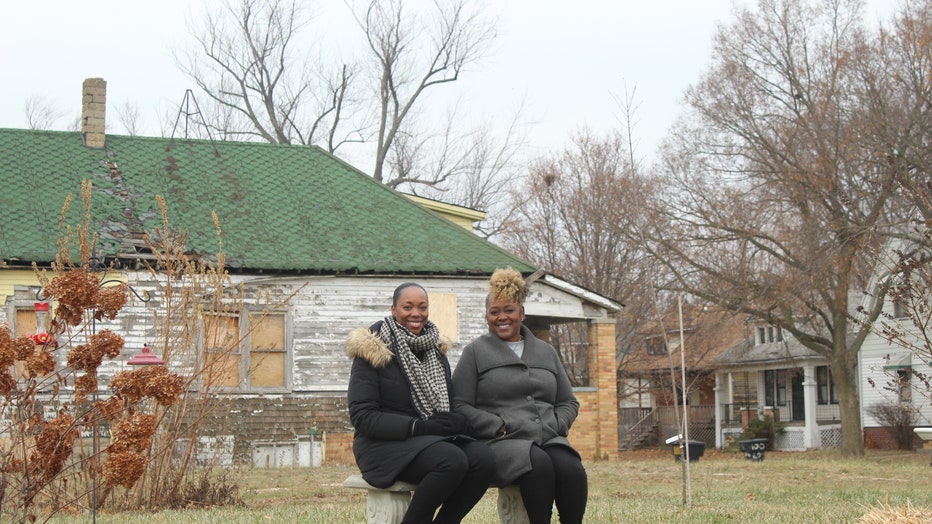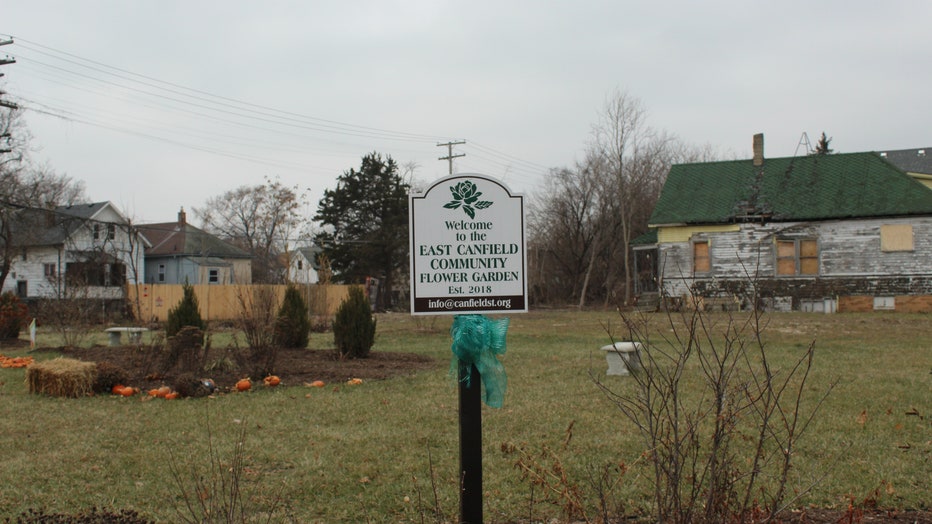Detroit sisters return to childhood home to restore neighborhood
DETROIT - Onlookers didn’t have to look far to see what Rhonda Theus was describing. In fact, they’d need only to swivel their heads to see.
“There’s been almost no development in the Canfield neighborhood in 25 years.”
Vacant houses and unproductive plots of grass filled the gaps between occupied homes in the neighborhood. This once-bustling community of 11,000 people has been reduced to a still suburb concealed under the shadow of the Detroit skyline. Buildings that housed movie theaters, grocery stores, record stores, and dry cleaners now sit empty.
The neighborhood and its businesses that lined the street corners once catered to a crowd that would populate most of Little Caesars Arena. Now, its uninhabited shells of concrete and empty parcels of land serve an audience that might fill the bleachers at a high school football field. Any sounds of kids playing in the neighborhood have been replaced with an all-encompassing stillness.
When Rhonda asks public officials or relevant organizations why there hasn’t been any development, she’s never gotten a satisfactory answer. In most cases, it’s “I don’t know.”
“It’s like we’re in this black zone,” she said.
When she cites requests made to the city to repair crumbling sidewalks or to remove dead trees, the city council dragged its feet, noting the lack of development in the area.
“It’s not even development, just doing the bare essentials of what a city is supposed to do for a neighborhood,” she said. “Even though we’re depopulated, we still have people who pay their property taxes. So for them to be ignored, it’s just disrespectful.”
For Rhonda and the legacy Detroiters that tell the story of their neighborhood, which extends from Warren to Mack Avenue and Cadillac Boulevard to Beneteau Street, the dearth of development that spans two-and-a-half decades is a fitting characterization of their home.
Except, that’s not entirely true. Surrounding Rhonda and her audience is a new garden with a walking path passing through the middle. On a scenic fall day when the sun was falling but the temperatures hadn’t quite, a ray shined on Rhonda’s face as she annotated the realization that had struck her recently.
“A lot of the time, people in our neighborhood are waiting for the cavalry to come,” she said. “Really, you know, the cavalry isn’t coming. We are the cavalry.”
The cavalry first arrived in 2016, when Rhonda moved back into her parent’s home on Montclair Street. A few years later, her sister Kim also moved back to Detroit, after working in New York City for much of her adult life. Prior to those years, an itch had grown between the two sisters as they reminisced over how much their neighborhood had changed.
It was an itch they couldn’t scratch, no matter how much they tried. So, they moved home.

Rhonda Theus unveils the Canfield Consortium's newly finished garden in October during a tour of lots completed with grant money from nonprofit Detroit Future City.
“Nobody across the U.S. had it as good as we Detroiters”
Rhonda and Kim’s heritage isn’t technically Detroit, although they do consider the city their home. Daughters to humble sharecroppers from Tennessee, their parents left agriculture in search of the better money that could be made working in the auto industry.
In 1965 after staying with an uncle for two months and renting a flat after that, they bought a house on Montclair when their dad got a job.
“My memory is very black Norman Rockwell,” said Kim. “Not a lot of vacancies, a lot of families there, a lot of families with kids, so we didn’t have to leave the block. Every street has a house that’s like a funhouse. We lived across the street from the school, (we) used to grassy areas to play kickball.”
There was a cornerstone called Mario’s where the manager gave them candy. There was an ice cream shop on Mac and Montclair. They didn’t have to walk far to go grocery shopping.
Kim says her childhood growing up in Canfield was “idyllic.” But she’s not the only one.
“As you may know, you could get a job and maintain your family - have a good living. Nobody across the U.S. had it as good as we Detroiters did because of the auto workers, and they started hiring African Americans,” said Jackie Stewart.
“It was a really wonderful neighborhood to grow up. It wasn’t perfect but it was a good neighborhood,” Rhonda recalls. “Lot of working-class people that took pride in their homes and were trying to build a good life.”
Stewart moved into the community in 1955. Before she traveled abroad, she never had any reason to leave the neighborhood. Everything she and her family needed was within walking distance. She once visited the Fox theater in an effort to see what else Detroit had to offer. She hated it.
It wasn’t just a diversity of businesses that inhabited the surroundings, however - Stewart remembers teachers and lawyers living in her those homes. She lived next to famed Piston Reggie Harding who taught her how to play basketball. Mayor Coleman Young, Detroit’s first black mayor also lived in the neighborhood.
After stints in Europe and Mexico, she moved back to the neighborhood in 1986, eventually settling in a home just down from the street from the one she grew up in. But by then, her neighborhood’s outlook, and Detroit’s overall, had begun to decline.
Canfield’s decline largely mimics the well-reported trends of Detroit’s population. In 1970, the city’s overall population was 1.51 million people. Census data from 2010 shows that number has declined by more than half - 713,777. Its current estimated population is 672,662. Data from the state demographer reveals an even sharper decline for the Canfield neighborhood: declining from 11,703 in 1970 to an estimated 2,600 by 2017.
When the city’s population was slashed, the number of vacant homes and unused parcels of land skyrocketed. Blight and dumping in largely silent neighborhoods rose, perpetuating issues of crime and plaguing an already poor tax base with systemic problems of poverty.
“It’s almost a slap in the face”
By 2005, Rhonda knew she wanted to move out of Detroit. She no longer felt comfortable living in the neighborhood.
“I’ve never felt afraid in my city. I don’t want to feel afraid,” she said. “It’s not a neighborhood where you’re afraid to come out of your house.”
Rhonda and Kim’s younger sister had been living in their parent’s home after they had died but was considering a move away, leaving the home vacant. While Kim was still in New York, Rhonda began making trips back to the home to preserve things and keep it usable.
The family had previously considered renting out the house, but selling it? That was never an option. To them, the legacy of their parents was rooted in the home they were raised in.
“For my parents, for a black person, owning a house was a big deal,” Kim said. “We saw how a lot of people - we have friends who grew up in the area - we saw how they left their parents home go to ruin and I couldn’t understand that. I saw how important it was to our parents.”
“In their will, there was a section about the house. It was something they cared about. We didn’t want to leave it vacant, to get blighted,” she added.
Kim admits Rhonda is more emotionally attached to the home than she is. As Rhonda began making trips back and forth from her home in Macomb to her parent’s home in Detroit, a creeping sense of familiarity and melancholy took over her as she renovated the home.
“I just had all this nostalgia and sadness about the condition of the neighborhood and so one thing led to another and I just made the decision ‘you know what, I’m going to move back here and make a difference,’” she said. “So many other legacy Detroiters in that neighborhood are in the exact same situation as me. They live in houses that were passed down from great grandparents, grandparents or parents they’re there because they want to honor their legacy.”
When officials tout the story of Detroit’s comeback, it doesn’t read like this - instead, taking on a more imperious tone. The city has climbed from bankruptcy and is issuing bonds backed by its own credit. Billions of dollars have been plugged into Detroit’s booming midtown as housing projects dot the city’s ever-expanding investment portfolio. Buoyed by rich investors like Dan Gilbert and the Ilitch family working to open more jobs in the city, Detroit’s rise-fall-and-rise-again is almost storybook.
RELATED: From prostitution, drugs & blight to a neighborhood garden, a Detroit woman is reclaiming her block
But it’s a nuanced return to fame and not one equally felt. Many of its residents that didn’t move away during the decline and have remained, feel neglected and forgotten.
“You could put it any way you like - I feel betrayed,” Stewart said. “I feel like they got us into some bad deals.”
“For my community, that is exactly how they feel. That is exactly how they feel,” Rhonda said. “Another thing that’s sad is people - because of the political disenfranchisement and the neglect - have just lowered their expectations.”
And to both Kim and Rhonda, that’s just wrong. Kim remembers hearing about construction that closed an exit from I-94 to the neighborhood that and residents were never informed.
“That would never happen in New York. If a subway station is being shut down, there are notices being put up two weeks in advance,” she said. “Things like that, it’s almost a slap in the face.”
“Their expectations are so low and they are happy they have street lights and I’m just like ‘that’s not anything to be happy about.’ I want to show people you should expect more, you should demand more from people who are supposed to be making the city better,” she added.
The first month since moving back into her home, Rhonda remembered her commute home from work would make her sad. She consciously decided to make the jump, but passing the blight and vacant land instilled an almost daily routine of melancholy in her.

Rhonda and Kim Theus sit on a bench on one of their parcels of land owned by the Canfield Consortium nonprofit.
So when Kim and her narrowed their focus, it wasn’t going to be “anything small potatoes.” And lucky for them, they didn’t have to start from scratch - only from memory.
“That’s one of the things I’m grateful for living in Macomb - that’s how it used to be,” Rhonda said, referring to how Canfield used to look. “It’s just a matter of restoring it.”
Renaissance on the Block
Detroit’s more nuanced comeback story that Rhonda and Kim embody is exactly what the city’s land bank has in mind when it sells back property.
Alyssa Strickland, a spokesperson for the city’s land bank, says the agency’s goal is to restore blight and return its land to productive use. How that land gets used fits a variety of molds - from residential to commercial purposes.
“Our number one priority is returning them to responsible ownership,” said Strickland.
So far, the Detroit Landbank has sold 21,000 properties. Of those sold, 1,069 have been purchased through the Community Partnership Program, which caters to nonprofits like the one established by Rhonda and Kim.
“This is something I’ve seen a number of times,” said Karla Marshall, who runs the program. “They come back to where they lived. I think a lot of people have a large attachment to their past. Even if you move away, you have an attachment to the place. They want to see it productive.”
RELATED: Detroit Future City awarding $20K grants to build rain gardens, green space
First, Rhonda started going to community meetings. After moving back to Canfield, she started meeting people and learning what they liked. She asked what they wanted to see in their neighborhood. She stopped by gas stations and businesses that are still open. Somewhere along the engagement process, she created a nonprofit where those ideas and renovations would live under. It’s named the Canfield Consortium.
The next step was to acquire and develop the land, but that meant money and navigating purchasing land from the city. A fateful meeting with Odell Tate, the city’s neighborhood revitalization director helped grease the wheels after learning they needed to be a Detroit Landbank Partner. If they were a partner, they could purchase property cheaply.
And the first lot they purchased? The old corner lot where Marios used to be - they bought it for $100. With a Detroit Future City grant they were awarded in 2018 and the purchase of two more adjacent lots, it was turned into a community flower garden on the corner of Canfield and Montclair Street.
Their second project was another garden - the one Rhonda found herself standing between in mid-October. Off of Lemay Street and just down the road from the first one, the Canfield Consortium got help the second time.

The first lot purchased by the Canfield Consortium sits at the corner of Canfield and Montclair. Both Rhonda and Kim Theus want to purchase the home next to the lot and turn it into a community center.
Against the backdrop of a massive FCA expansion happening on the east side of Beneteau Street, several volunteers from the company aided in beautifying the lot.
Now, the nonprofit owns 14 lots with concrete plans for what will take up that space - and it’s starting to have an effect.
“People are starting to recognize what she’s doing, people who can make decisions that impact the neighborhood - from the political and financial standpoint,” said Dina Pearson, a neighborhood group board member. “Her neighbors are starting to get more involved, they’re starting to look at making changes to their own home because of it.”
RELATED: "Just scratching the surface;" how Detroit's vacant land problem became a solution
Between the transactions of land and money is the sister’s almost opposite personalities working in tangent. Kim said after their parents died, they have gotten closer as sisters.
“Kim is the planner-idea person. I’m the implementer project person,” Rhonda said. “We knew we wanted to be involved in the neighborhood being developed, but we had no golly idea what that would entail.”
“I applaud Rhonda for what she’s done,” Kim said. “She’s someone the people in the neighborhood trust and I don’t think she takes that trust for granted.”
Jackie Stewart said the progress made by the sisters has given her hope. Pearson, who used to live in the city and moved out, feels the same way. Rhonda argues it’s that connection between the neighborhood and the people that grew up in it gives it an intangible quality - and one she wants to see again.
“Our neighborhood isn’t nearly as beautiful as Macomb, but to me, it has something more valuable,” she said. “The spirit of connectedness between residents - when I walk out of my door, I was connected with someone. That’s one of the biggest things.”
Unfortunately, there are very few physical spaces where people can connect in the neighborhood. Even the neighborhood meetings are held outside of the neighborhood due to the lack of space, which is why some of the things at the top of the sister’s list include cultivating that shared space.
There are plans to build a community vegetable garden on one of the purchased lots. Across from the Barack Obama Leadership Academy on Canfield, the two want to build a pavilion where those vegetables will be available. If the nonprofit can acquire the house next to their first garden before its demolished, the sisters want to put a micro-community center where anyone in the neighborhood can congregate.
“I feel like tearing down blighted structures sounds like a good idea, but who wants to live in a neighborhood where there’s nothing left?” asked Kim. “Success is building on that empty land so that every piece of land has an identity and has a purpose and it’s not just sitting there.”
Jack Nissen is a reporter at FOX 2 Detroit. You can contact him at (248) 552-5269 or at Jack.Nissen@Foxtv.com

